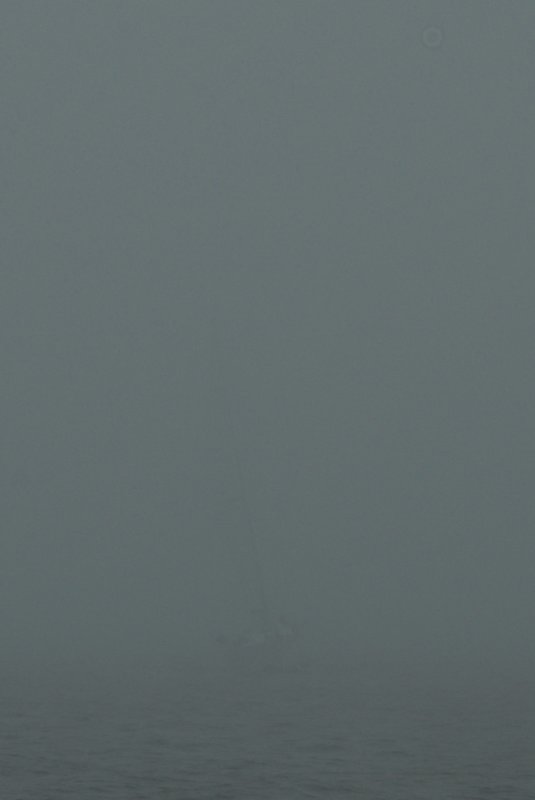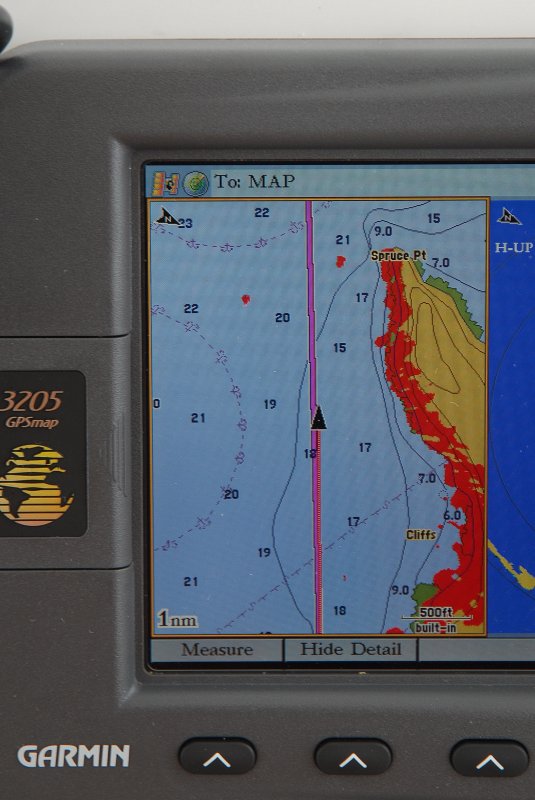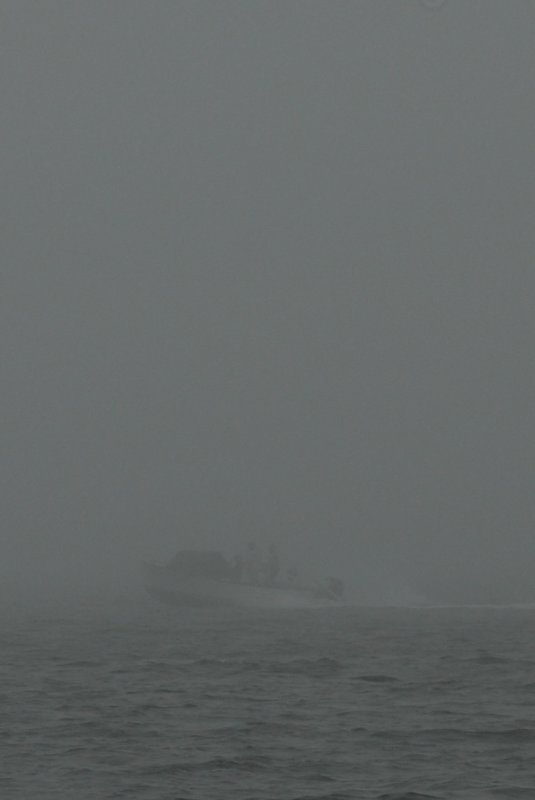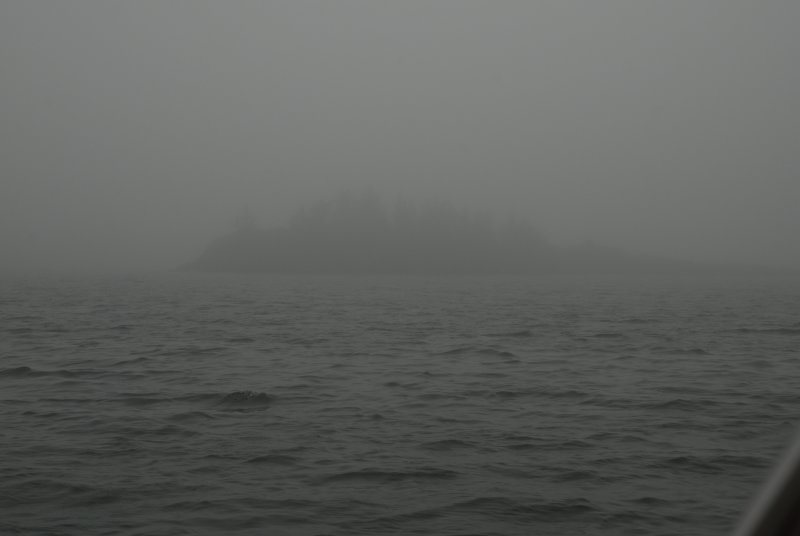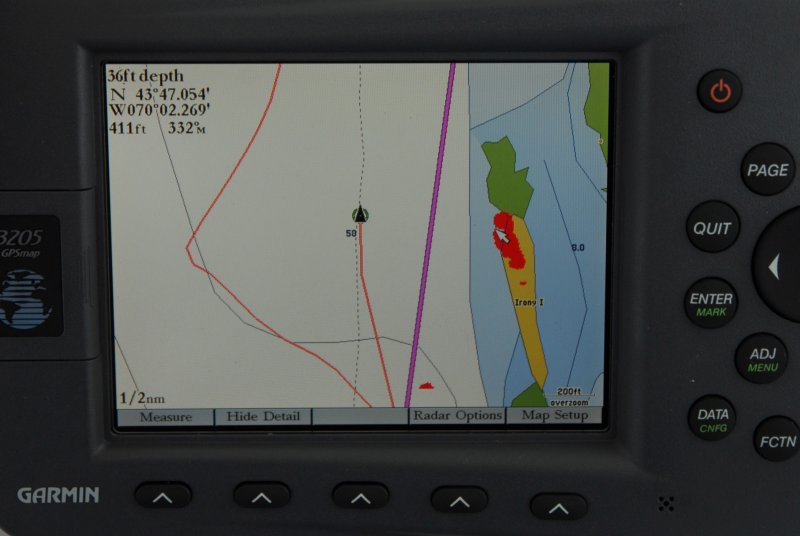If you don't sail in the fog in Maine you're not going to do much sailing...

Having been a commercial lobsterman fog is like any other day to me, except for the new breed "digital captains" who know nothing about fog and never boated or worked in it before Loran, radar, plotters etc.....
I know I have posted the below post before but I will put it here again:
Ok this is going to be a little bit of a frustration rant but mostly at folks who probably do not participate in these forums anyway.. I'm sure you guys don't behave like this..
I just returned from a rather foggy cruise and the growth of the GPS plotter is causing some rather inflated man jewels, (brass balls), on the water. No, make that big reckless man-jewels.
As one who grew up navigating in the fog, before the advent of GPS plotters, Loran & radar and also one who spent thousands of hours working the foggy waters of the North East as a commercial lobsterman & while fishing for Blue Fin Tuna, I am alarmed at the new quality of boaters who are willing to venture out in this stuff, totally ill prepared, being guided by nothing more than blind faith and a GPS screen.
Thick fog deserves RESPECT and you must use some common sense when out in the soup.
Here's a list of some things I witnessed, not just once, but many times over just one week, in visibilities from 70 feet to about 400 feet.
Boat #1 - Sailboat from MA in 100 feet of visibility = No running lights, no radar reflector, no radar, no fog signals/horn, boat not a good radar target & barely showing up about every third sweep, not monitoring VHF 16 or any of the standard channels.
Boat #2 - Sea Ray from South Portland doing 30+ knots in 150 feet of vis. Picked up at 1 mile out as a random sea clutter type of return, tracked it, and realized it was a vessel moving at a high rate of speed directly towards me. Made hard turn to stbd and Sea Ray passed seconds later within 70 feet. Did not slow down, did not respond to VHF 09, 13, 16 or 72 hails. No fog horn, no radar, no running lights no radar reflector boat showed up like sea clutter at best. If my radar screen was anywhere other than the helm he might have run us down.
Boat #3 - Center console from the mid coast doing close to 30 knots and heading straight for a nun. This is what all the "inexperienced in fog boaters" do in fog. Do yourself a favor and STAY AWAY FROM MARKS IN THE FOG! Set your course well proud of any widely used nav aids. All the "new bravado" guys with plotters & no radar head straight for them.
"Hey baby, see how cool this GPS thingy is, we almost hit that can!":
I could go on and on and on from just a short trip. Please don't get me wrong we did meet plenty experienced skippers of boats who were using proper fog etiquette, communications, lights & signals but there seem to me more and more people who have NO CLUE how dangerous they really are to themselves and others.
If your one and only tool for navigation in the fog is a plotter, please, please, please STAY PUT! You don't absolutely need radar, though more so today than in the 70's or 80's because inexperienced people did not go out in the fog as they do today, but you DO need some other items to communicate and let others know of your presence.
If you can afford a boat, and to risk your life and the life of others, in 100 foot visibility, you can certainly afford a VHF, a fog horn/signal, running lights and a radar reflector. Are these items too much to ask for? Apparently they are for far too many boat owners these days..D'oh....
Things to do when in fog to be a good boater and to be courteous to others.
Radar Reflector = BUY ONE AND USE IT!!!! Just because you choose not to have radar does not mean you should choose to be invisible or nearly invisible to the rest of the world who may be practicing good collision avoidance. Even the supposed "worst performing" radar reflectors work better than none at all. I almost always run my radar in clear weather, not just in fog, so I do see the differences.
Radar = If you have radar it should not just be reserved not just for foggy days. Please get in the habit of running your radar on
clear days and tuning it for what you can see around you. Most owners are shocked when they run their radar in clear weather and realize how poorly they have it tuned. If you can't see the targets on a clear day you can't see them in the fog.
VHF = Use it, and by that I mean turn the darn thing on and monitor VHF 16. PLEASE! Others don't have your cell number on speed dial. Beyond that it is also Federal law that you monitor VHF 16 if your boat has a VHF.
Running Lights = When the visibility drops use them! They do help and can add another 50-100 feet of warning.
Fog Signals = For Christ sake Wal*Mart sells sports air horns for $6.00. Please get one and use it properly. Many VHF's also have built in fog hailers and the FogMate is inexpensive.
Slow Down = A single sailboat traveling at 6 knots is covering 10.1 feet per second. In 100 feet of visibility the collision time to a fixed object is roughly 11 seconds from your first physical sighting. Now take two sailboats converging, each traveling at 6 knots, your collision time in 100 feet of visibility, from your first physical sighting, becomes just 5 seconds.
A power boat traveling 30 knots, on a collision course, will collide with a sailboat doing six knots, at 100 feet of visibility, in under two seconds from the first sighting! You will NOT have enough reaction time to avoid a collision with a clown like this other than to have radar and been tracking him. Think people don't go fast in the fog? Think again..
Some photo examples of what these reckless boaters look like:
There really is a boat here a few hundred feet off my stern. No radar, no reflector, no running lights, no horn signals and not even a VHF response. "Dumb dee dumb, sailing awayyyy, dumb dee dumb, doh', a boat, how'd that get there?"

 Here's a radar shot of that boat when it was actually showing up. It's the red spec just above the 18 foot spot off my stbd stern quarter. The two targets ahead and to port and stbd were two J Boats traveling together both of which had reflectors when they went by. SOME BOATS JUST DO NOT SHOW UP ON RADAR!!! The guy behind me owns one!
1st class clown (see speed above), no radar, no lights, no horn signals, no reflector and also not showing up well, and not monitoring VHF!
For reference this is 400 feet of visibility from yesterday morning (400 feet is generally fairly good vis for Maine fog):
And here's the screen shot with the cursor just over the closest radar image at 411 feet (upper left corner measures distance).:
Here's a radar shot of that boat when it was actually showing up. It's the red spec just above the 18 foot spot off my stbd stern quarter. The two targets ahead and to port and stbd were two J Boats traveling together both of which had reflectors when they went by. SOME BOATS JUST DO NOT SHOW UP ON RADAR!!! The guy behind me owns one!
1st class clown (see speed above), no radar, no lights, no horn signals, no reflector and also not showing up well, and not monitoring VHF!
For reference this is 400 feet of visibility from yesterday morning (400 feet is generally fairly good vis for Maine fog):
And here's the screen shot with the cursor just over the closest radar image at 411 feet (upper left corner measures distance).:
It scares me how many people are just plain dangerous and have no clue they are being so reckless. If they succeed once they do it again only this time with a greater level of bravado and confidence..
Rant off...

